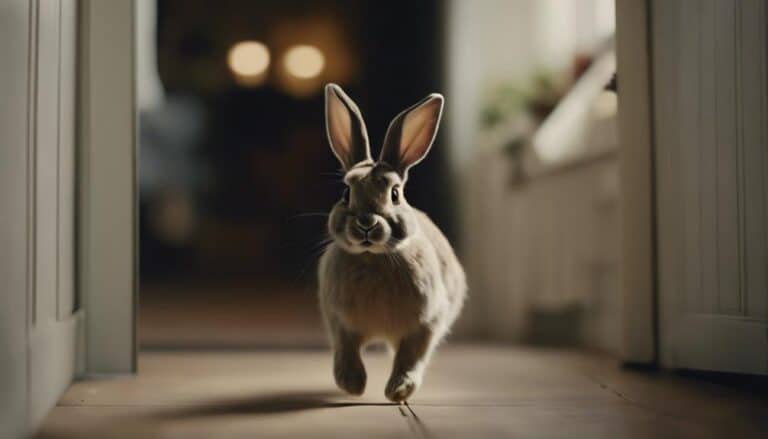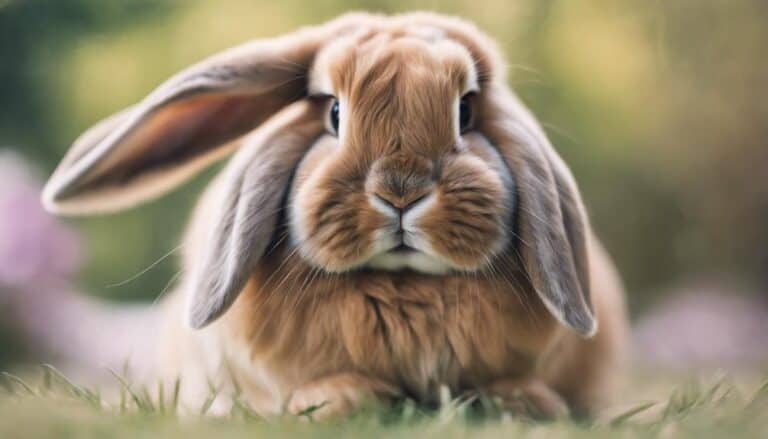Imagine coming home to find your bunny happily hopping around their spacious enclosure, munching on fresh veggies.
However, you might be wondering, can bunnies truly be content in enclosures? While the initial thought may raise concerns, there are factors that can contribute to a thoughtful and balanced perspective on this topic.
The debate surrounding whether bunnies should be confined revolves around various considerations that impact their well-being and quality of life.
Contents
Key Takeaways
- Cage size crucial for bunny's well-being, providing safety and security.
- Enriched environment in cages promotes natural behaviors and happiness.
- Proper setup and maintenance ensure health and comfort in confinement.
- Transition to free roaming possible with gradual adjustments for enhanced well-being.
Pros and Cons of Caging Bunnies
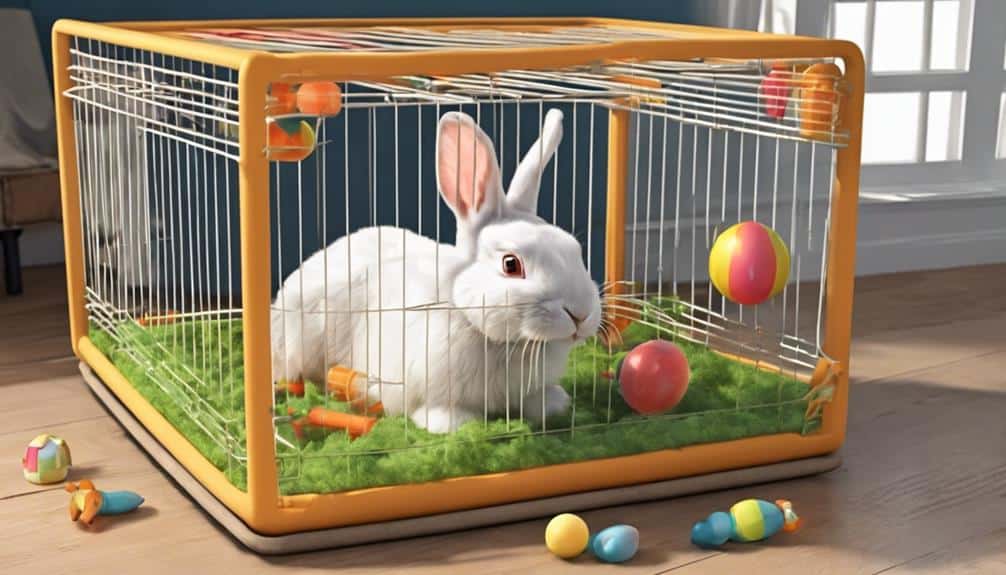
When considering the pros and cons of caging bunnies, it's important to weigh the benefits of safety and security against the potential limitations on their freedom of movement. Cages can serve as a safe haven for rabbits, protecting them from potential dangers and providing a designated space for rest and feeding. For pet rabbits, a cage can offer a sense of security and comfort, especially during transportation, vet visits, or times when confinement is necessary for their safety. Properly sized cages can also help control a rabbit's diet, preventing overeating and restricting access to harmful substances.
However, while caging bunnies can be beneficial, it's essential to make sure they've ample space for movement, enrichment activities, and regular interaction to promote their well-being. Balancing the security of a cage with opportunities for exercise, mental stimulation, and socialization is vital for maintaining a healthy and happy pet rabbit.
Bunny Cage Size Requirements
To guarantee the well-being of your pet bunny, remember that cage size is essential. Providing ample space for your rabbit to move around freely is vital for their physical and mental health.
Consider the specific needs of your bunny's breed when choosing the appropriate cage size.
Cage Space Importance
Properly sizing your bunny's cage is essential to guarantee their physical and mental well-being, as insufficient space can result in health issues and behavioral problems. Rabbits should ideally have at least 8 square feet of housing space to prevent problems like obesity and deformities. Providing 24 square feet of exercise space daily is vital for their overall welfare. Small cages can restrict a rabbit's natural behaviors such as exploring, running, and jumping, which can lead to a decrease in their happiness. Many owners choose free-roaming setups in rabbit-proofed areas to make sure their rabbits have enough space to move and play. Ensuring adequate housing space for your rabbits promotes their health, happiness, and overall quality of life.
| Rabbit Needs | Space Required |
|---|---|
| Housing Space | At least 8 sq ft |
| Exercise Space | 24 sq ft daily |
| Natural Behaviors | Running, jumping, exploring |
| Free-roaming Options | Rabbit-proofed areas |
| Welfare Promotion | Health, happiness, quality of life |
Bunny Exercise Needs
Ensuring your bunny's utmost physical and mental well-being requires providing a cage with at least 8 square feet of living space to meet their exercise needs. Here are three essential facts to ponder when addressing your small pet rabbit's exercise requirements:
- Size Matters: Small cages can lead to health problems like obesity and deformities in bunnies.
- Daily Exercise: Providing 24 square feet of exercise space daily is essential for your bunny's well-being.
- Free Roaming: Opting for free-roaming bunnies in rabbit-proofed areas is a popular choice to fulfill their exercise requirements.
Cage Setup Essentials
For best well-being, make sure your bunny's cage size is at least four times the size of the rabbit, providing ample space for movement and comfort. Depending on the breed, this could mean a cage around 24x24x36 inches for small rabbits or 36x36x120 inches for larger breeds.
Essential items in a rabbit cage include a litter box, water bowl, hay rack, pellet dish, and toys to guarantee their well-being. Proper housing is vital, with wire-sided cages for ventilation and solid flooring like plastic for easy cleaning.
To meet exercise needs, rabbits require an exercise area of at least 24 square feet. Use baby gates or pens with a height of 3-4 feet to create a safe and comfortable space for your rabbit to move around.
Cage Vs. Free Roaming Debate
When deciding between a cage and free-roaming for your bunny, remember that cage size matters for their well-being.
Ensuring your bunny's safety should be a top priority, whether they're in a cage or exploring freely.
Enriching your bunny's environment with ample space and opportunities for natural behaviors is key to their happiness and health.
Cage Size Matters
Proper sizing of rabbit cages greatly impacts their overall well-being and health. When it comes to housing your bunnies, consider the following:
- Health Risks of Small Cages: Small cages can lead to health problems such as obesity and deformities in rabbits.
- Space Requirements: Ideally, rabbits should have at least 8 square feet of housing space and 24 square feet of exercise space daily.
- Free-Roaming Alternatives: Many rabbit owners opt for free-roaming setups in rabbit-proofed areas to provide ample space for exploration.
Ensuring your rabbits have adequate space is important to prevent stress and allow them to engage in natural behaviors like running and jumping. By prioritizing cage size, you promote a healthier and happier environment for your furry companions.
Bunny Safety First
To secure the well-being of your bunnies, consider the benefits and drawbacks of cage confinement versus free roaming in a rabbit-proofed environment.
Rabbit owners often face the dilemma of whether to keep their animals in a hutch or allow them to roam freely around a safe space. While cages provide a designated area for the rabbits, free roaming allows them to move around more naturally, promoting mental stimulation and physical exercise.
Rabbit owners must be cautious about toxic plants and other potential hazards when opting for free roaming. Creating a rabbit-proofed environment can help mitigate safety concerns, ensuring that your bunnies stay healthy and happy.
Bonding with your rabbits and providing them with a secure home base can enhance their overall quality of life.
Enriching Bunny Environments
Securing a cage or allowing free roaming in a rabbit-proofed area are both viable options for enriching bunny environments. When considering pet rabbits, ensuring they've enough space to move around freely is essential.
Whether you opt for indoor hutches or outdoor hutches, make sure to let your rabbit out for exercise and mental stimulation. Providing a Rabbit Hutch with hide boxes, toys, and tunnels can keep rabbits engaged and happy.
Interaction with humans is important for their socialization, regardless of the environment. Remember, balancing cage time with supervised free-roaming sessions can cater to your bunnies' physical and mental needs effectively.
Ensuring Bunny Safety in Cages
When considering the safety of your bunny in cages, prioritize providing a secure and appropriately sized enclosure. Pet stores are often far from ideal when it comes to housing options for rabbits. Rabbits need a place where they can exhibit their natural behaviors and have space to move around comfortably.
For female rabbits, it's important to make sure they've a suitable cage or hutch that meets their needs. Outdoor hutches can offer containment and protection from predators, making sure that your domestic rabbit stays safe and secure.
To guarantee bunny safety in cages, it's vital to invest in a hutch that provides enough space for your rabbit to engage in activities like playing and hiding. A well-designed enclosure should also include separate areas for feeding, access to water, litter trays for hygiene, toys for mental stimulation, and options for regulating heat.
Cage Setup for Bunny Happiness
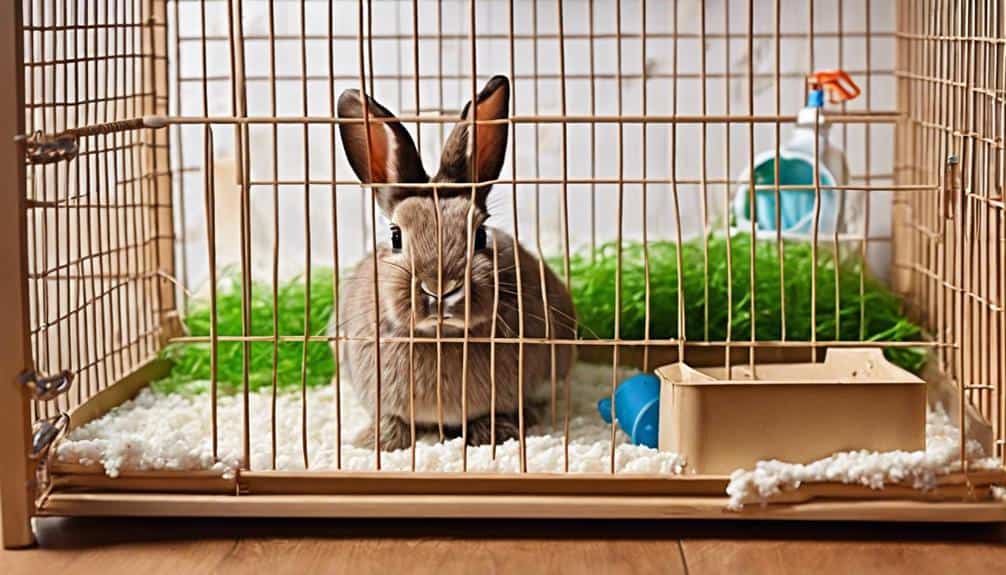
For ideal bunny happiness, make sure the cage setup includes ample space for movement and natural behaviors. To guarantee the happiness of your pet rabbit, consider the following key elements:
- Enough Room for Activities: Provide a secure enclosure that allows your rabbit to hop, run, and explore freely. A confined space can lead to stress and health issues.
- Daily Exercise Outdoors: It's crucial to let your rabbit enjoy the outdoors under supervision. Fresh air and sunlight contribute to their well-being and happiness.
- Properly Designed Enclosures: Invest in a hutch that offers separate areas for hiding, playing, feeding, and other essential activities. A well-equipped enclosure enhances the quality of life for your pet rabbit and promotes their natural behaviors.
Cage Cleaning and Maintenance Tips
To guarantee the well-being of your pet rabbit, maintaining a clean and hygienic cage is important. Regular cage cleaning is essential to prevent odor buildup and keep your rabbit healthy. Use pet-safe disinfectants when cleaning the cage and accessories to ensure a safe environment for your furry friend. Additionally, replacing the bedding regularly is important to provide a fresh and comfortable living space for your rabbit.
In addition to cleaning, regular cage maintenance is necessary. Check the cage structure for any signs of wear and tear to prevent any safety hazards to your rabbit. Ensuring the cage is in good condition is essential for your pet's well-being.
To keep your rabbit mentally stimulated while in the cage, provide enrichment activities and toys. These activities help prevent boredom and promote a healthy and happy rabbit. By maintaining a clean cage, ensuring rabbit safety, and providing enrichment activities, you can create a safe and comfortable environment for your beloved pet while controlling odors effectively.
Transitioning Bunnies to Free Roaming
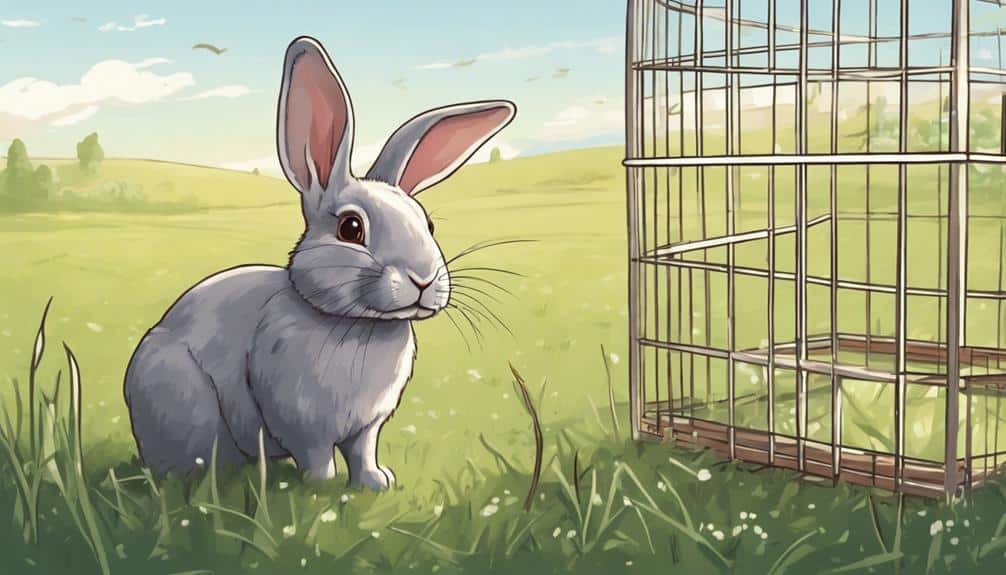
Consider allowing your bunnies to explore beyond their cages by shifting them to free roaming in a safe and rabbit-proofed environment. Moving your bunnies to free roaming can greatly enhance their overall well-being and happiness.
When setting up a free-roaming space for your rabbits, make sure you provide a designated home base where they can retreat to feel safe and secure. Experimenting with different setups within the designated area can help you find the most suitable arrangement for your bunnies.
Remember, it's important to create a safe environment by rabbit-proofing the space to prevent any potential hazards. While free roaming can be beneficial, limiting the roaming area initially can help your rabbits adjust gradually and keep them safe.
Frequently Asked Questions
Is It Cruel to Keep Rabbits in Cages?
Keeping rabbits in appropriately sized, secure cages is not cruel. It secures their safety, well-being, and protection from harm. Providing space, enrichment, exercise, and outdoor alternatives are essential for addressing ethical concerns and promoting their psychological health.
How Long Can a Rabbit Stay in a Cage?
In a cage, a rabbit can stay content for 4-6 hours with ample space, exercise, and mental stimulation. Regular interaction outside the cage is important to prevent health issues. Keep the cage clean and enrich the environment for their well-being.
Are Cages Safe for Rabbits?
In considering the safety of cages for rabbits, it's important to provide adequate space, proper bedding, and opportunities for exercise. Indoor habitats with appropriate size and material, coupled with playpen options, can guarantee their well-being.
Do Rabbits Do Well in Cages?
You'll find that rabbits can thrive in indoor cages with ample space, enrichment options, and bonding time. Properly sized cages, exercise opportunities, and a clean routine contribute to their well-being, minimizing potential behavioral issues.
Conclusion
To sum up, while keeping bunnies in cages has its advantages, it's important to prioritize their well-being by providing spacious enclosures, opportunities for exercise, and a safe environment.
Remember, a happy bunny in a well-maintained cage is like a shining star in the night sky – a sight to behold and a joy to care for.
So, make sure to give your furry friend the love and attention they deserve in their cage home.


